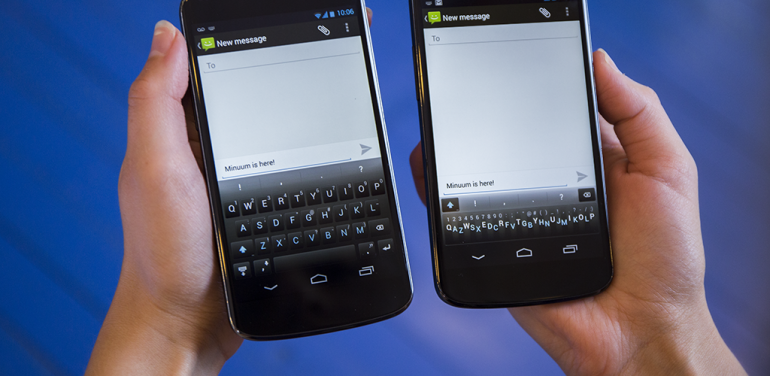Toronto-based Whirlscape has released version 1.1 of its experimental, forward-thinking keyboard for Android devices.
Minuum, which raised over $85,000 earlier this year through crowdfunding site Indiegogo (Kickstarter wasn’t yet available to Canadian entrepreneurs), has released a public beta to the Google Play Store for $3.99, slightly under the $5 required to be an initial backer.
“Over 8,000 [of the original 9,500 contributors] have remained active users,” said Whirlscape CEO and Minuum creator, Will Walmsley. The latest version adds a full-sized keyboard for the times when a one-dimensional version isn’t practical, and takes its first step towards multi-language support by adding QWERTZ and AZERTY layouts.
“Users don’t always need to save small portions at the bottom of the screen,” said Walmsley, but said that he and many other Minuum backers use the keyboard full-time. “It is [now] useful for any possible use case.”
To that end, the team also added voice recognition to the app, another feature that has become commonplace in Android keyboards, from the stock Google version to popular alternatives like Swype and SwiftKey.
But many of the improvements in version 1.1 aren’t visible to the user, coming in the form of improved predictions. Minuum prides itself on being able to accurately predict what you want to say, even when the actual letters typed do not resemble real words. The app takes note of what words you type frequently, and puts them at the front of an expanding list of possibilities.
The new version also lets users back up personalized data for easily transferring between devices. This is the first step towards a cloud saving system, which will let users synchronize saved dictionary data through Minuum’s servers.
When asked about Minuum’s upcoming wearable developer kit, a suite of tools designed to adapt the input software to non-phone platforms like fabrics and smart watches, Walmsley said they are months away from an early version. They have seen great demand for the technology, especially for uses in accessibility software.
Down the road — and Walmsley tempers expectations here by saying that this is years away — Minuum could work by plugging into brain waves, and the team is taking the first steps towards wearable prototypes now.


